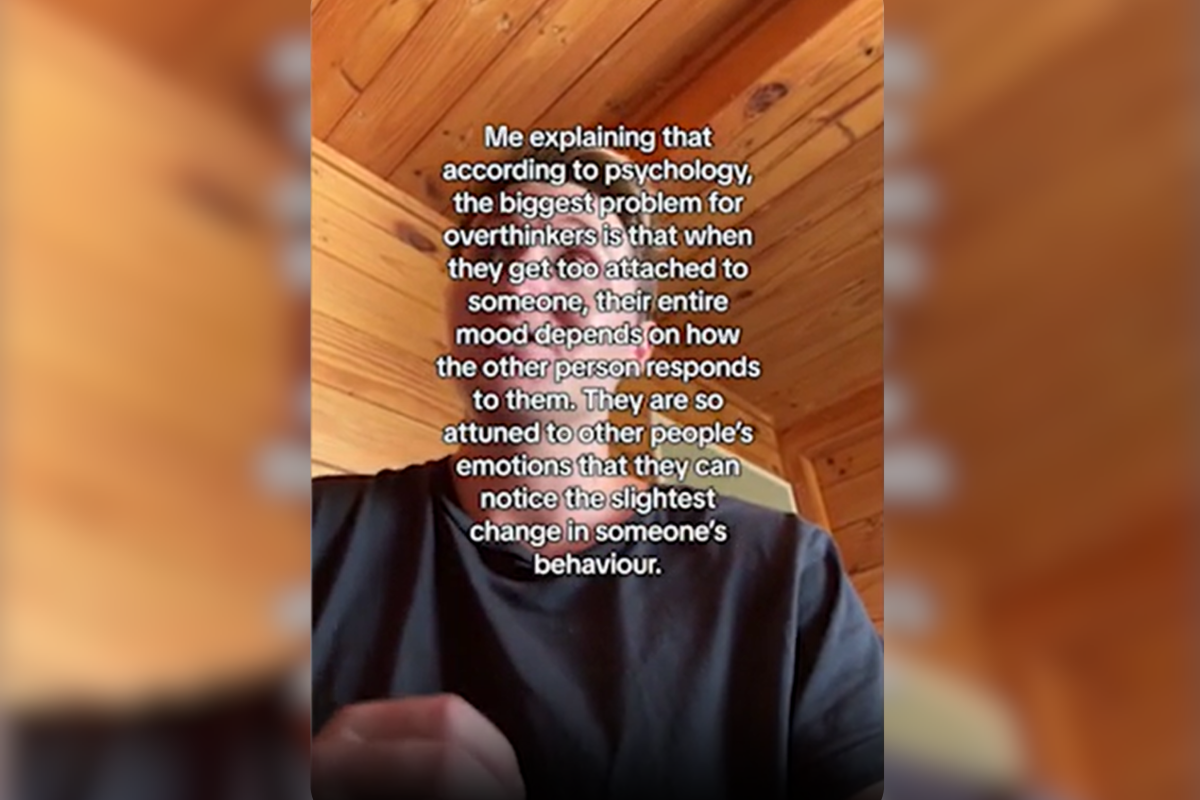A psychology student has gone viral after revealing one of the biggest triggers for overthinkers, and has spoken to Newsweek about the best ways of overcoming this problem.
While Josh Fraser-Young, 21, regularly shares psychology tips and advice on TikTok (@joshfraseryoung), it was a post about overthinkers that has captured the attention of more than 17 million people.
In the post, he explained that "the biggest problem" for overthinkers is getting "too attached to someone" and being dependent on their mood. Becoming that attached to another person can mean that even the slightest change in their behavior will have an effect on both people in the relationship.
Some might see that as the sign of a strong connection, but Fraser-Young, from Christchurch, New Zealand, told Newsweek that it can be an issue for people who overthink situations because it can "dictate their mood" and even lead them to sabotage relationships.

He said: "The issue is that overthinking is inherently inward focused as it allows people to feel in control, which is a common need as people like to feel a sense of autonomy. For this reason, overthinkers often find themselves trying to control the uncontrollable, such as their partner's mood.
"Overthinkers often have an anxious attachment style. So, when their partner doesn't respond how they want or expect them to, they see this as a problem within themselves. For example, if their partner is having a bad day and shows signs of agitation, an overthinker might fear they did something wrong, or worry that their partner will leave them."
Fraser-Young describes an overthinker as someone who has to think through every possibly scenario, outcome, and emotion that may arise. This can be hereditary for some people, while others may develop it "as a defense mechanism" following a chaotic upbringing.
However, he insists that this negative spiral can be combatted and overcome, usually by detaching oneself.
Fraser-Young continued: "Once you realize you are complete as you are, you don't need any external validation to fulfill you. The best way to practice detachment is to prioritize self-care, and spend time doing things you enjoy.
"Cognitive behavioral therapy can also help. Essentially, when you catch yourself overthinking, write down those thoughts and then dispute them by writing the opposite down to break overthinking patterns."
What Does an Expert Think?
Following the online reaction to Fraser-Young's TikTok video, Newsweek spoke to clinical psychologist and author Monica Vermani, who specializes in stress, mood, and anxiety.
She agrees that overthinkers tend to be highly anxious and their internal pain can spill over onto the people around them. She explains that they often seek validation, but when others don't engage in their excessive planning or analysis, overthinkers can become "misunderstood or dismissed."
Vermani told Newsweek: "People who overthink can be pessimistic in their mood and demeanor. Just as overthinkers cause other people to stress, they can become affected by other people's moods, anxieties, and differing opinions. In the presence of other people who are overthinking or anxious, an overthinker can pick up on and feed off this energy."
She recommends engaging in therapy to work on the strategies and skills to overcome this mindset, as well as developing positive thoughts to move forward. Overthinkers will usually doubt and blame themselves, but if they can learn to feel more confident and reframe their doubts, they can be calmer and more at ease.
Since gaining more than 17 million views and 2.5 million likes on TikTok, many people have commented and reached out to the university student to share their own experiences.
"The social media reaction has been quite amazing. It is something a lot of people seem to resonate with," he told Newsweek. "A lot of people relate to it as it is something so many of us seem to experience.
"It is a very common phenomenon, and it isn't all negative as there are some positives to overthinking as well—which is why we do it. Every individual is different, so we can't generalize. However, it seems to be a common theme among overthinkers."
Overcoming this won't happen overnight, but Fraser-Young says that people will be "less susceptible to falling victim" to their destructive thoughts once they can start to enjoy their own company. Feeling sufficient in oneself is a sign of real progress.
The viral TikTok post has already amassed over 6,600 comments at the time of writing, as one person asked: "OK but what's the solution for this?"
Another TikTok user responded: "Also it's like you're more invested in their life instead of your own."
While another comment reads: "This is not OK, why is this so accurate?"
Have you noticed any red flags that made you end a relationship? Let us know via life@newsweek.com. We can ask experts for advice, and your story could be featured on Newsweek.
Uncommon Knowledge
Newsweek is committed to challenging conventional wisdom and finding connections in the search for common ground.
Newsweek is committed to challenging conventional wisdom and finding connections in the search for common ground.
About the writer
Alyce Collins is a Newsweek Life and Trends reporter based in Birmingham, U.K. with a focus on trending topics that ... Read more





